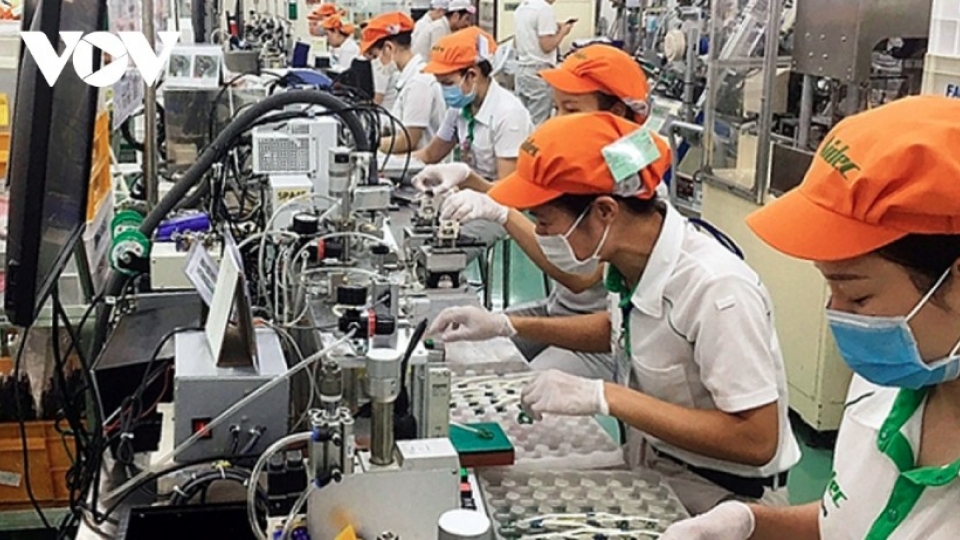Foreign investment attraction in new era: from cost gain to institutional trust
Vietnam is actively recalibrating its core investment prospects from cost gain to institutional trust, said Dr. Sven David, general director and CEO at VIET Transformation Advisors.

In his article posted on dautu.vn on July 21, he analysed the landscape of foreign direct investment (FDI) in Vietnam in the new context. For decades, low labour costs and an abundant workforce served as Vietnam’s key competitive advantages. Today, a more durable, compelling asset steadily takes their place: institutional credibility. This foundational shift is no longer merely theoretical, strong empirical evidence substantiates it.
According to the Foreign Investment Agency under the Ministry of Finance, in the first half of 2025, foreign direct investment inflows surged by an impressive 32.6% to US$21.52 billion. This robust growth underlines Vietnam’s emergence as a pivotal investment destination within a dynamic regional landscape, where even countries like Thailand recorded a 34% increase in foreign investment during the first five months.
Yet, the deeper transformation lies not in headline figures, but in profound policy changes, infrastructure enhancements, and a burgeoning culture of administrative accountability reshaping the entire investment ecosystem.
David said that Vietnam’s investment climate has long benefited from its inherent dynamism and sense of possibility. As the nation matures economically, it consciously shifts towards a model grounded in predictability, transparency, and trust. The transition from informal arrangements and ad hoc decisions to a system governed by clear, rules-based frameworks is reshaping how investors view and interact with the Vietnamese market.
This structural evolution is vital not only for attracting fresh capital, but also for engaging a more sophisticated cohort of strategic investors: those seeking long-term certainty and a transparent operating environment. It signals Vietnam’s intent to transition from a cost-based manufacturing hub to a destination for sustainable, high-value investment.
Vietnam’s determined push for administrative reform reflects two concurrent forces: domestic demands for improved governance and international expectations shaped by a complex global investment context, especially in the wake of developments like Base Erosion and Profit Shifting 2.0.
The government has responded decisively. As reported by the Ministry of Home Affairs in 2025, a major restructuring of central government institutions reduced ministries and central agencies by approximately 20%.
Far from symbolic, these efforts represent a fundamental redefinition of the state’s role: transitioning from a traditionally cautious gatekeeper to an agile, transparent, and responsive facilitator, the author said, adding that this captures a pivotal development: the replacement of informal, discretionary systems with more predictable and formal structures, which serve as the cornerstone of long-term institutional trust.
Reform and realignment
Vietnam’s journey towards smart governance is anchored in a national commitment to comprehensive digital transformation. The strategy for e-government development towards 2030, issued in 2021, laid the strategic groundwork for this shift, setting the stage for the full digitalisation of public services by the end of 2025, with broader digital government and society goals extending to 2030. Operational aspects are advanced through rules like those in 2024 establishing unified standards and predictable timelines for administrative procedures.
Particular emphasis is placed on reforming domains that have historically challenged investors, especially licensing and land administration. These areas are undergoing detailed process reengineering. Where once ambiguity and discretion prevailed, Vietnam now introduces standardised, repeatable, and digitally enabled processes, David said.
These reforms improve efficiency and enable more consistent investor experiences across provincial and sectoral boundaries. While implementation varies regionally and remains technically complex, the overarching approach is pragmatic, sustained reform focused on infrastructure modernisation and tailored, context-sensitive execution.
This transition to predictable systems constitutes a form of “confidence infrastructure,” an essential enabling layer that enhances trust between state and investor.
Institutional credibility has moved decisively to the centre of Vietnam’s foreign funding strategy. This includes greater transparency, procedural consistency, and enforce able legal frameworks. The revised legal environment aligns investment incentives more closely with environmental, social, and governance (ESG) priorities and digital transformation objectives.
Criteria for sectoral eligibility and strategic project classification are now more clearly defined, in contrast to broader frameworks such as the ASEAN Comprehensive Investment Agreement.
This alignment offers two significant advantages. Firstly, it brings Vietnam closer in line with global tax norms such as those outlined under the Organisation for Economic Co-operation and Development’s Pillar Two framework and enshrined domestically through 2023 regulations on global minimum tax. This reduces fiscal uncertainty for multinational corporations and mitigates potential for international tax disputes.
Secondly, and equally important, it sends a compelling message to sophisticated investors that Vietnam is serious about institutional maturity and regulatory integrity. These investors increasingly view regulatory certainty as a critical factor, often placing it on par with traditional considerations like workforce availability, geographic positioning, or supply chain integration.
This reflects a broader truth that Vietnam no longer needs to be the easiest market, but it can be the most trusted. The country redefines its competitive advantage: not by lowering barriers, but by raising standards of clarity and reliability. This approach invites businesses committed to long-term success to plan and operate with greater confidence.
Speeding up, not rushing
Vietnam’s momentum echoes the founding spirit of its economic reforms in the 1980s: pragmatic, forward-looking, and non-ideological. The country proactively constructs a more robust and credible institutional foundation, rather than merely responding to external pressure.
While this evolution may temporarily lengthen some admin processes or demand new procedures, it simultaneously establishes the groundwork for something far more valuable: enduring institutional trust.
This strategic pivot significantly enhances Vietnam’s capacity to attract and retain high-quality investment, crucial for sustainable economic development, technological advancement, and inclusive growth. As the country prepares for deeper integration into global regulatory systems, including the expansion of ESG disclosure frameworks, it communicates a clear and confident message to the world: Vietnam is not only open for business, it is committed to building institutions that can support its most ambitious economic goals.



